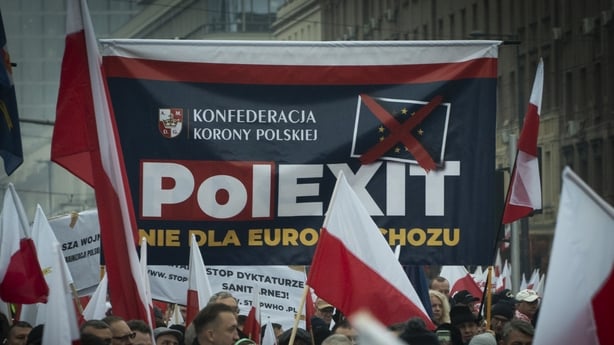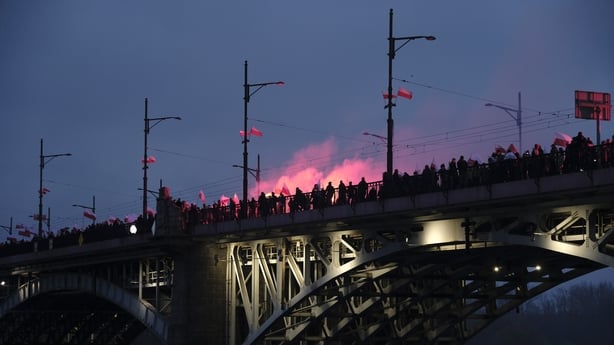Red flares lit up the evening sky in central Warsaw yesterday as tens of thousands of people took part in an ultra-nationalist march to mark Polish Independence Day.
A large police present was visible at key intersections of the Polish capital and traffic was blocked from entering the downtown district.
In recent years, the march, organised by Polish far-right groups, has resulted in violent confrontations between participants and police.
Members of the ultra-nationalist National Radical Camp occupied the centre of the march, waving the group's black flags.
Participants of the march walked across Poniatowski Bridge over the Vistula river, a route taken each 11 November for the past decade, before gathering at Poland’s National Stadium to hear speeches from far-right leaders.
We need your consent to load this rte-player contentWe use rte-player to manage extra content that can set cookies on your device and collect data about your activity. Please review their details and accept them to load the content.Manage Preferences
Krzysztof Bosak, the co-leader of the far-right Confederation party, which won 18 seats - the smallest of any party - in last month’s general election spoke to the crowd.
Along the route of the march, anti-abortion banners displayed graphic images of dead foetuses.
Other banners featured anti-LGBTQ messages and one read "Stop the 'Ukrainisation’ of Poland".
Another banner read ‘PolExit’, a term used for a Polish exit from the European Union, a movement supported by a small minority of people in Poland.

Parents with young children were present at the march but most participants were young men, wearing armbands in the colours of the Polish flag.
A separate march, by people calling themselves anti-fascists, took place close to the route of the ultra-nationalist march.
Participants of that group waved LGBTQ flags and held up placards reading ‘Yes to Refugees. No to Fascists’.
Representative of far-right movements from elsewhere in Europe were also present.
Paul Golding, the leader of the far-right Britain First party, posted a video on X, formerly Twitter, showing that he was in Warsaw for the march, accompanied by Law and Justice MEP Dominik Tarczynski.
In 2018, Mr Golding was sentenced by a court in Kent to 18 weeks in prison after being found guilty of religiously aggravated harassment, an offence classified as a hate crime by England’s Crown Prosecution Service.
A group of Millwall FC fans were also present, waving their team’s banner reported Polish newspaper Gazeta Wyborcza.

Warsaw’s liberal mayor Rafal Trzaskowski said city authority’s estimated that about 40,000 people attended the ultra-nationalist march.
However, independent online news service Onet estimated that between 70,000 to 90,000 participants attended.
Unlike previous years, no major incidents of violence were reported.
Polish Independence Day marks the date, 11 November 1918, when Poland regained its independence after 123 years of partition and occupation by Prussia, Austria-Hungary and Imperial Russia.
The date is marked by wreath-laying ceremonies and military parades throughout the country.
Speaking yesterday morning at Warsaw’s Tomb of the Unknown Soldier, Poland’s President Andrzej Duda said that Russian imperialism "wanted to take away the sovereignty of other countries" - a reference to Russia’s war in Ukraine but also to Poland’s own recent history of Moscow-dominated rule.







